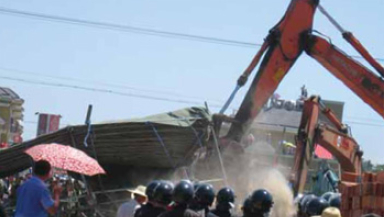
A communist official in China has condemned the rapid growth of Christianity in the region as "excessive", but has denied allegations of increased persecution.
Officially an atheist state, the right to freedom of religious belief is guaranteed under Article 36 of the Chinese Constitution but protections are limited to those who worship within state-sanctioned bodies.
Chinese Christians often suffer at the hands of government authorities, and the Asian superpower is ranked the 37<sup>th worst country in the world for Christian persecution by the Open Doors World Watch List.
Despite this, reports suggest that between 3,000 and 10,000 people are turning to Christianity every single day in China, and while there were just one million believers in total when the Communist party came to power in 1949, there are now thought to be as many as 100 million.
It is perhaps unsurprising, therefore, that the government is said to be stepping up its defences against those who practise the religion, with 12 churches in Zhejiang province currently facing demolition.
Believers are refusing to back down, however. Thousands of Chinese Christians flocked to a church in Wenzhou last week to protect it from being torn down by city officials.
A 24 hour human shield has been established at Sanjiang church following a demolition notice which states that it has been constructed illegally. Those mounting the protest say they will not leave until they are sure their church is safe.
Li Jingliu, a member of Sanjiang church for 34 years, declared: "I will guard the church until the very end, without fearing hardship or death."
"They said the holy cross was built too high and violated the building code, but why only target churches when many buildings violate height limits?" Timothy Liao, a priest from Wenzhou, asked. "Clearly, this is a pretext to tear down churches."
Though officials have countered claims of an offensive against church buildings, the chairman of Zhejiang's ethnic and religious affair committee is reported to have denounced the growth of Christianity as "too excessive and too haphazard" in a recent speech.
The committee's website notes that Feng Zhili also criticised "deep-rooted" problems in the development of Christianity in the region, and has condemned the way in which it has apparently caused "social friction".
Just yesterday, the UK's Prime Minister David Cameron declared that Christians "are now the most persecuted religion around the world" and called for the international community to "stand up against persecution of Christians and other faith groups wherever and whenever we can".













